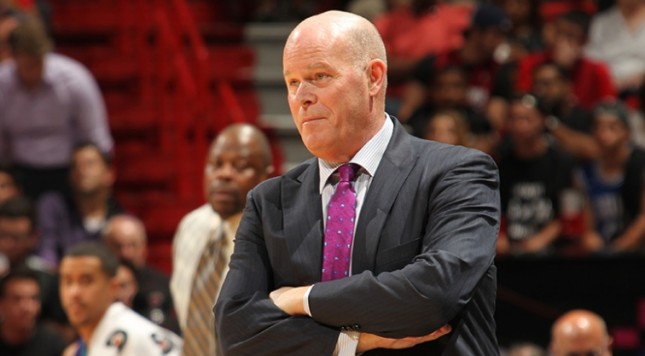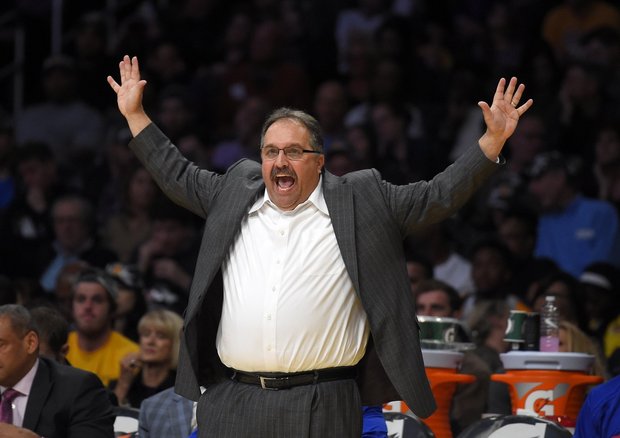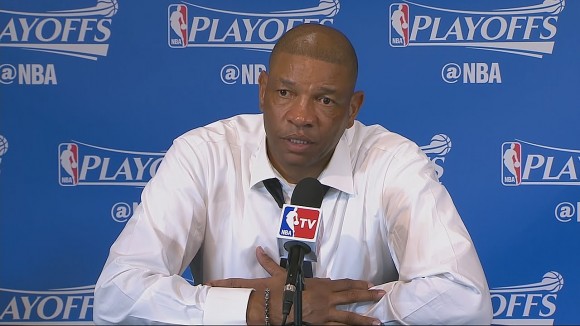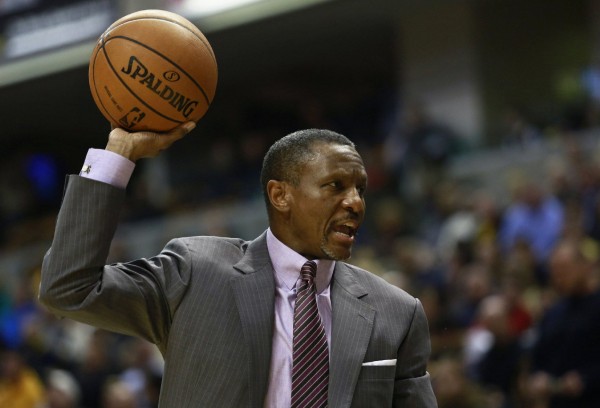The first round of the 2016 NBA Playoffs was a most peculiar fortnight filled with a number of upside-down occurrences.
The central counterintuitive reality of the first round is that the losing coaches in many of the eight series were better than the winning coaches… certainly in a 4-1 series, and possibly even in a sweep.
Would anyone contest the notion that — relative to the amount of resources available — Rick Carlisle of the Dallas Mavericks got more out of his team than Billy Donovan (poor Billy D — he’s in a no-win situation in these playoffs…) did from the Oklahoma City Thunder? Sure, OKC won in five, but Dallas’s ability to:
A) not get swept;
B) win on the road;
and
C) stay in the fight into the fourth quarter in a majority of the five games in the series
represents a terrific achievement when placed in a larger context.
The more one sees what Carlisle did with this group in 2016, the more it makes sense for Dwight Howard to go to Dallas. Carlisle could become “The Dwight Whisperer,” and if the scenario comes to pass, the Mavericks could give Dirk Nowitzki a chance to win at least one more playoff series before he’s through.
*
In the Cleveland-Detroit series, Tyronn Lue did not coach poorly. Putting Kevin Love at the 5 gave the Cavaliers and offensive structure which worked. Cleveland put minimal stress and strain on LeBron James by ending this series in four games. LeBron will be fresh for the Atlanta Hawks, which is just what this team needs if it wants to have a real chance at winning the NBA title.
Yet, while Lue did not stumble in his first-ever playoff series, Stan Van Gundy — supplied with an inadequate power forward; a big man (Andre Drummond) who his barely more than 1 out of every 3 foul shots; and Steve Blake as his backup point guard — still pushed the Pistons to the point that they had a chance to win in the final three minutes of three separate games against Cleveland. Only Game 2 spun violently out of control for Detroit. Dave Joerger of the Memphis Grizzlies coached extremely hard against the San Antonio Spurs, but Van Gundy’s performance against Cleveland was the best showing by a coach on the losing end of a sweep in the first round.
The overuse of Paul Pierce was a problem against the Portland Trail Blazers, but other than that, Doc Rivers kept his team together in a situation which easily could have unraveled. Without Chris Paul and Blake Griffin, the Clippers played Portland on dead-even terms in seven of the eight quarters which comprised Games 5 and 6. Only the fourth quarter of Game 5 got away from the Clippers, and that was because Damian Lillard went into God Mode.
All in all, Rivers did a marvelous job after CP3’s injury (which was added to Griffin’s injury). Even though J.J. Redick was physically limited, which further diminished the Clippers’ margin for error, the Clippers defended as well as they realistically could. Los Angeles had to make certain concessions to Portland in its eroded state, and the Blazers’ role players — Moe Harkless, Mason Plumlee, Allen Crabbe — made enough contributions to lift Portland to the second round.
General manager Doc Rivers is a problem, and to a certain undeniable extent, it’s hard to separate the coach from the GM, especially in the case of playing Pierce too many minutes. Yet, if one can sift through the particular details of those two crafts, the coach did well in the face of towering obstacles. It’s the GM who has to figure out a new way to align the puzzle in Los Angeles.
*
Next, let’s turn to the best series of the first round: Hornets-Heat.
Erik Spoelstra might have left Hassan Whiteside out of the lineup for a few minutes more than he needed to in Games 3 through 6. Miami Heat fans certainly agonized when Josh McRoberts stayed in games, or when Charlotte’s bigger lineups flourished. Within the specific confines of each game and its own nuances, Spo didn’t enjoy his best series.
However, Spoelstra and the Heat won this series because of the adjustments the coach made within the course of the regular season. Had Spoelstra not changed the fundamental nature of the offense to give Goran Dragic more freedom, it’s highly doubtful that Dragic would have soared in Game 7 as he did. Had Spoelstra not entrusted rookies Justise Winslow and Josh Richardson with so many responsibilities — in ways other inferior coaches would have been reticent to do — they wouldn’t have been able to provide the perimeter defense which helped keep the Hornets in check.
Spoelstra is a bastion of stability and structure for the Heat. Dwyane Wade and Chris Bosh certainly solidify that locker room, but Spoelstra reminded observers how firm and dependable a voice he possesses. That resonant presence matters in a Game 7, and it had the Heat more than prepared for their big moment on Sunday against Charlotte.
Yet, while Spo won that series, his opponent coached the better series.
Steve Clifford 4 2+ min. on why adjustments don't necessarily need to be made after allowing 238 points in 2 games: pic.twitter.com/1l9kAH9BtS
— John Schuhmann (@johnschuhmann) April 21, 2016
The irony here is that after discussing at length how he didn’t necessarily need to make adjustments following Game 2 of the Hornets-Heat series, Charlotte head coach Steve Clifford made the fundamental adjustment of going bigger. It’s true that Marvin Williams — by shooting better in the middle games of this series — validated Clifford’s Game 2 sermon. Yet, Clifford just as genuinely reshaped this series by throwing more size at the Heat.
Miami averaged 119 points and 58-percent shooting from the floor in the first two games. The Heat didn’t reach 89 points in each of the next three games, and it was only because Dwayne Wade did something he hadn’t done since December of 2015 — namely, hit a three-pointer — that Miami escaped elimination in Game 6.
Marvin Williams was hurt. Cody Zeller was pushing through obvious pain in this series. Michael Kidd-Gilchrist was out for most of the season, not just this series. Nic Batum was banged up and missed Game 3. Yet, there were the Hornets, down only two (90-88) with 1:33 left in Game 6 with a chance to close out the Heat. Clifford very much embodied a first round in which many of the losing coaches did better than their counterparts.
If Steve Clifford and other losing coaches excelled in the first round, one winning coach didn’t do very well at all.
Dwane Casey’s Toronto Raptors advanced to the second round, but it’s hard to put the coach at the top of the list of reasons why the 2 seed defeated the 7 seed in the East.
Casey took over four games to keep DeMar DeRozan on the floor when Paul George subbed out for a breather. Using DeRozan coming around screens as opposed to isolation plays was another adjustment which should have occurred much earlier in the series. Casey’s work with Norman Powell definitely represents one of his better accomplishments from the season and in this series. Giving Powell the assignment of defending Paul George — not being afraid to make that move — definitely helped the Raptors. Yet, for the most part, the continued sluggishness of the Raptors’ offense — not reining in DeRozan when he was hoisting bad jump shots — reflected poorly on Casey’s overall coaching acumen.
On the other side of that series, Frank Vogel should be given some leeway if only because his bench gave him so little to work with. A coach is only as good as his options, and Vogel didn’t have many against Toronto. That said, Vogel had two chances before the 9:30 mark of the fourth quarter of Game 5 to re-insert Paul George into the lineup. Two fouls committed before the 9:30 mark gave Vogel a pair of openings in which to get his star back on the court with a rest of roughly two game minutes. At the time, Indiana had not scored in the fourth quarter but still led by 11 points (90-79). If George had re-entered then, perhaps the Pacers’ offense would have been able to regain the rhythm which was so noticeably present through the first three quarters.
There are no guarantees in life, but by waiting until the 8:36 mark of the fourth to get George back in — Toronto had shaved its deficit to only seven at that point — Vogel increased the odds that his team would lose Game 5… which it did.
The first round officially ended with a Game 7 Sunday night in Toronto, but the Pacers-Raptors series decisively turned partly because of Frank Vogel’s tardy decision in the fourth quarter of Game 5.




